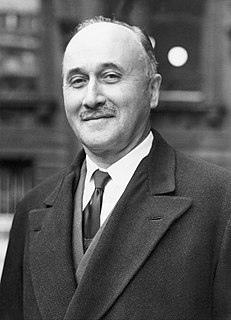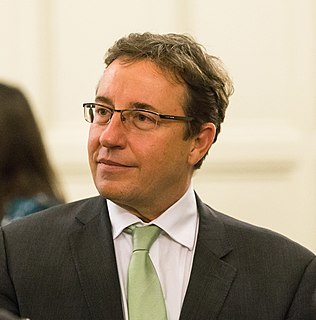A Quote by Franklin D. Roosevelt
On both sides of the line, we are so accustomed to an undefended boundary three thousand miles long that we are inclined perhaps to minimize its vast importance, not only to our own continuing relations but also to the example which it sets to the other nations of the world.
Related Quotes
Our possibilities of happiness are already restricted by our constitution. Unhappiness is much less difficult to experience. We are threatened with suffering from three directions: from our own body, which is doomed to decay and dissolution and which cannot even do without pain and anxiety as warning signals; from the external world, which may rage against us with overwhelming and merciless forces of destruction; and finally from our relations to other men. The suffering which comes from this last source is perhaps more painful to us than any other.
We are not wholly patriotic when we are working with all our heart for America merely; we are truly patriotic only when we are working also that America may take her place worthily and helpfully in the world of nations . . . Interdependence is the keynote of the relations of nations as it is the keynote of the relations of individuals within nations.
Modern education is competitive, nationalistic and separative. It has trained the child to regard material values as of major importance, to believe that his nation is also of major importance and superior to other nations and peoples. The general level of world information is high but usually biased, influenced by national prejudices, serving to make us citizens of our nation but not of the world.
In the space of one hundred and seventy-six years the Mississippi has shortened itself two hundred and forty-two miles. Therefore, in the Old Silurian Period the Mississippi River was upward of one million three hundred thousand miles long, seven hundred and forty-two years from now the Mississippi will be only a mile and three-quarters long. There is something fascinating about science. One gets such wholesome returns of conjecture out of such a trifling investment of fact.
I want to create a rapid response team, right around the world, perhaps starting originally with our partners, similar to the one we have in the United Nations whereby, where there's a problem in our society which demands a compassionate response, an educated, informed, not just a splurgy emotional thing, but an informed compassionate response that puts yourself in the position of the other and sees all sides of the problem, not just your own, there'll be somebody poised in each society who can write to the media, write an op-ed piece, to go on TV or radio.
I am like all other atheists only in that I do not believe there are any gods. Beyond that, I may differ dramatically in my values and beliefs from any other atheist. On both sides of the political spectrum, one can find the neo-conservative Objectivists and the ultra-liberal Communists, both of whom hate each other. These two factions take up nearly opposite sets of values, yet both are comprised of unabashed atheists.
Have I said clearly enough that the Community we created is not an end in itself? It is a process of change, continuing in that same process which in an earlier period produced our national forms of life. The sovereign nations of the past can no longer solve the problems of the present: they cannot ensure their own progress or control their own future. And the Community itself is only a stage on the way of the organized world of tomorrow.
Certainly each side - the 'absolutists' and the 'constructivists' or 'humanists', as I've labelled them - accuses the other of hubris, and lays claim to humility. I see hubris on both sides: a pretence that we could ascend to an objective account of the world, on the one hand, and a pretence that we have the resources to live and act without a sense of there being something to which we answerable, on the other. So both sides are 'villains'.

































